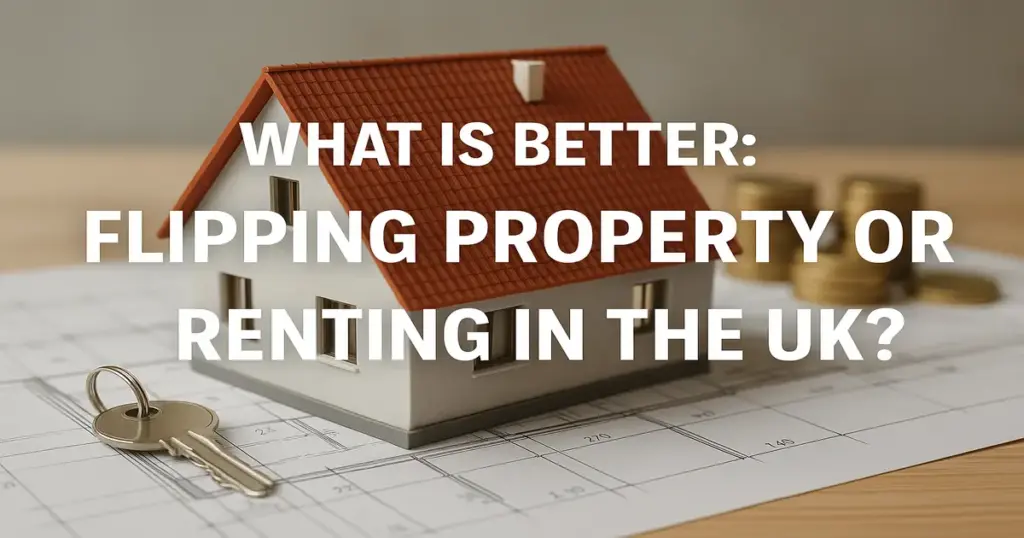What Is Better: Flipping Property or Renting in the UK?
The UK property market offers various investment strategies, but two of the most prominent are property flipping and buy-to-let renting.
Both can generate significant profits, but they come with different risks, timeframes, and levels of involvement. Deciding which is better depends on your financial goals, market knowledge, available capital, and risk appetite.
Understanding Property Flipping
Property flipping involves purchasing a property at a lower price (often because it needs refurbishment), renovating it, and then selling it for a profit. The goal is to buy low, add value through improvements, and sell high, usually within a short timeframe, often 6 to 12 months.
Pros of Property Flipping
- Quick Profits: If the flip succeeds, investors can realise a return on investment (ROI) much faster than renting.
- Capital Recycling: Quick turnovers allow you to reinvest in new properties more frequently.
- No Long-term Tenant Issues: You’re not responsible for managing tenants or handling ongoing maintenance.
- Market-Driven Upside: If the timing is right, rising property prices can magnify profits.
Cons of Property Flipping
- Market Volatility: Profits may be wiped out if property prices fall or stagnate.
- Renovation Risks: Costs often exceed budgets, and projects may take longer than expected.
- Tax Implications: Profits are subject to Capital Gains Tax and possibly income tax if flipping is your main trade.
- High Entry Costs: Upfront capital is needed not just for purchase but also for refurbishment.
Understanding Renting (Buy-to-Let)
Renting involves purchasing a property and leasing it to tenants. This strategy generates monthly rental income and may also benefit from long-term capital appreciation.
Pros of Renting
- Regular Income: Rental yields provide a steady cash flow.
- Long-term Appreciation: Property values often increase over time, enhancing wealth.
- Tax Deductions: Mortgage interest and maintenance costs may be deductible.
- Pension-like Security: A portfolio of rental properties can offer financial security in retirement.
Cons of Renting
- Tenant Issues: Problems with late payments, damage, or legal disputes are common.
- Ongoing Management: Properties need constant upkeep and regulatory compliance.
- Tax Changes: Recent legislative changes have reduced mortgage interest tax relief and introduced higher stamp duty rates.
- Lower Liquidity: It takes time to sell a rental property, and capital is tied up.
The Financial Perspective
Flipping: High Reward, High Risk
From a financial perspective, property flipping can offer high short-term returns, especially in an appreciating market. However, it’s speculative. After renovation and transaction costs, a successful flip might yield a 15–30% return on the total investment. But if the market dips or unforeseen costs arise, profits can vanish—or even become losses.
Renting: Consistent Income, Slower Growth
Renting accumulates returns over time. Net rental yields in the UK typically range between 3% and 7% annually, depending on location and property type. When you add capital appreciation, total annual returns might vary between 5% and 10% over the long term. It’s a slow-and-steady approach suited for those looking for sustainable income.
Risk Comparison
Flipping is inherently more volatile. Its success depends heavily on market timing, refurbishment efficiency, and buyer demand. The financial impact can be severe if the property sits unsold or the market dips.
While not risk-free, renting offers more stability. Even during downturns, people need housing. If managed well, rental properties can provide consistent returns regardless of market conditions.
Time and Involvement
Flipping: Intensive and Hands-On
Flipping requires active involvement. From scouting deals to managing renovations and coordinating with estate agents, the process demands time, effort, and often project management skills. It’s best suited for investors who can commit the time or hire a trusted team.
Renting: Ongoing, But Manageable
Buy-to-let properties also require attention—tenant communication, property maintenance, legal compliance—but much of this can be outsourced to letting agents. While you’ll need to remain engaged, especially with regulatory changes, the time requirement is more spread out and less intense.
Regulatory and Legal Considerations
Flipping properties involves fewer ongoing regulations, but planning permissions and building regulations still apply, especially for major renovations.
Renting, by contrast, is tightly regulated in the UK. Landlords must comply with the Housing Act, ensure properties meet safety standards, handle tenant deposits correctly, and keep up with frequent legal updates. The Renters Reform Bill and other government actions may continue to reshape the landlord-tenant landscape.
Tax Implications
Flipping
- Capital Gains Tax (CGT): Profit from selling a flipped property is usually subject to CGT unless it’s your primary residence.
- Income Tax: If flipping is a full-time business, profits may be taxed as income rather than capital gain.
- Stamp Duty Land Tax (SDLT): Flippers pay stamp duty, often with a surcharge for additional properties.
Renting
- Income Tax: Rental income is taxed after deducting allowable expenses.
- Wear and Tear Allowance: Previously available tax reliefs have been curtailed.
- Mortgage Interest Relief: Now limited to a basic-rate tax credit rather than full deduction.
Market Trends in the UK
The UK housing market has experienced growth and uncertainty in recent years. COVID-19, Brexit, and inflationary pressures have led to fluctuating prices. While urban areas like London saw a plateau, regions such as the Midlands and the North have seen robust growth. This has made location-specific strategies more important than ever.
Flipping tends to flourish in rising markets, particularly where demand and supply are limited. Renting is more robust across varying conditions, especially in university towns, commuter belts, and cities with high rental demand.
Financing Considerations
Flipping often requires bridging loans or cash purchases. These loans are short-term and come with high interest but offer flexibility. Traditional buy-to-let mortgages are available for rentals, but lenders now have stricter affordability tests and require larger deposits.
Your financing route may dictate your strategy. If you can access cash or short-term loans quickly, flipping becomes viable. Renting is more suitable if you prefer predictable, long-term debt with regular income.
Which Strategy Is Right for You?
Ultimately, the better option depends on your circumstances:
Flipping Is Better If:
- You have a strong understanding of the property market and renovation processes.
- You can commit significant time and energy to projects.
- You prefer short-term gains over long-term income.
- You are comfortable with risk and market volatility.
Renting Is Better If:
- You want a steady, passive income stream.
- You are interested in long-term wealth building.
- You want to diversify your investment portfolio with a relatively stable asset.
- You prefer slower, more predictable growth.
Combining Both Strategies
Some investors use a hybrid approach: Flip a few properties to build capital and reinvest that money into rental properties. This combines short-term profit with long-term income and wealth growth and helps hedge against market cycles.
Final Thoughts
There’s no universal answer to the flipping vs. renting debate. The right choice depends on your financial objectives, risk tolerance, time availability, and expertise. Successful property investors often experiment with both strategies over time. If you’re starting, seeking advice from financial advisers or property investment mentors may be wise.
Frequently Asked Questions (FAQs)
Q1: Is property flipping legal in the UK?
Yes, flipping property is legal. However, you must comply with all planning regulations, building codes, and tax requirements. It’s treated as a business activity for tax purposes if done regularly.
Q2: Do I need a license to be a landlord in the UK?
You may need a landlord’s license in many areas, especially England and Wales. Requirements vary by council and are stricter for HMOs (Houses in Multiple Occupation).
Q3: How long does a property flip usually take?
Typically, a flip takes between 6 and 12 months from purchase to sale. This includes time for renovation, marketing, and the legal sale process.
Q4: What are the average costs involved in flipping?
Costs include purchase price, stamp duty, legal fees, refurbishment costs, estate agent fees, and taxes. For unforeseen expenses, a 10–20% buffer of the property’s value is advisable.
Q5: Is renting passive income?
It can be, especially if you hire a letting agent. However, repairs, tenant turnover, and legal compliance require ongoing attention.
Q6: Which cities in the UK are best for flipping?
Cities like Manchester, Leeds, and Liverpool have grown substantially and offer good flipping opportunities due to increasing demand and lower entry prices than London.
Q7: What are typical rental yields in the UK?
Rental yields vary but generally range from 3% to 7%. Northern cities often offer higher yields, while London and the South East provide more capital appreciation.
Q8: Can I use a mortgage to flip?
Traditional residential mortgages aren’t suitable for flipping. Bridging loans or development finance options are more common.
Q9: Are there penalties for selling a buy-to-let property too soon?
While there’s no official penalty, early sales can attract higher taxes (CGT) and may impact your mortgage terms or incur early repayment fees.
Q10: Which is more tax-efficient: flipping or renting?
Renting offers more tax-deductible expenses over time, while flipping may result in higher short-term tax liabilities. However, tax efficiency depends heavily on your financial structure and other income.
If you’re considering investing in property in the UK, weigh the benefits and drawbacks of flipping vs. renting carefully. Consider starting small, gaining experience, and combining the two for a balanced portfolio.
Government & Legal Resources
HMRC – Tax on Property Income and Capital Gains
https://www.gov.uk/tax-sell-property
Guidance on how taxes work for property sales and rentals, including CGT and income tax.UK Government – Renting Out Your Property
https://www.gov.uk/renting-out-a-property
Official guide for landlords, covering safety checks, deposit protection, and licensing.Stamp Duty Land Tax (SDLT) Guide
https://www.gov.uk/stamp-duty-land-tax
Check how much SDLT you’ll pay when buying a property, including surcharges for second homes.Planning Permission Guidance (England)
https://www.planningportal.co.uk/
Use this for planning permissions, building regulations, and permitted development rights.Read our top Blogs:
Sell My Property Fast For Cash In Wandsworth
What to Do If Your House Won’t Sell: Fast Solutions That Work
How to Sell House Fast: Proven Tips to Get a Quick Sale Without Estate Agents
Call +447702210159 our friendly team for a same-day offer





